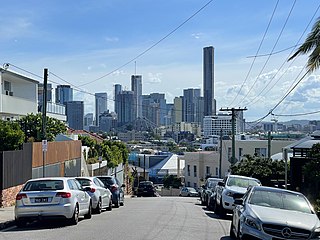See also
- Monier Field, a baseball venue in Charleston, Illinois, USA
- Monier Group, a roofing company
- Monnier (disambiguation)
Monier is a French name that may refer to the following notable people:
Suresh is an Indian masculine given name originating in the Sanskrit word sureśa. Its meaning is "Ruler of Gods" and it has been used an epithet for the Hindu gods Indra, Brahma, Vishnu and Shiva.

Spring Hill is an inner northern suburb in the City of Brisbane, Queensland, Australia. In the 2016 census, Spring Hill had a population of 5,974 people.

Teneriffe is an inner suburb of Brisbane, Australia, 2.5 kilometres (1.6 mi) north-east of the CBD. lt borders Fortitude Valley to the north-west, Newstead to the north and New Farm to the west and south.
Arvind is a common Indian masculine given name. Its meaning is lotus.The name is of Hindu origin .Its variants include Arvin, Arvy, Aravinda, Aravindan, Arahvinth and Aravindh(a), and Aurobindo, Arabinda.
Anirban or Anirvan is an Indian masculine given name. It is mostly used in the Bengali and Assamese languages. The meaning of the Sanskrit word anirvāṇa is "the fire that never stops" or "unextinguished". Notable people with this name include:

The M5 Legacy Way is a 4.6 kilometres (2.9 mi) long tunnel linking the Western Freeway at Toowong and the Inner City Bypass at Kelvin Grove, Brisbane. The project consisted of two bored tunnels carrying two motorway grade lanes of traffic in each direction. It opened on 25 June 2015 and is the fourth of five components of Brisbane City Council's TransApex Project. The tunnels will be tolled for approximately 45 years.

Jean Monier was a French painter. He was born and died in Blois.
Pierre Monier or Mosnier was a French painter.
Monnier is a French surname. Notable people with the surname include:
Akhila is a Hindu/Sanskrit Indian given name, which means "whole" or "complete". Notable persons with the name include:
Sudhir is an Indian masculine given name. The Sanskrit word sudhīra means "very wise", "resolute".
Abhinava is an Indian name. The Sanskrit word abhinava has the meaning new. Notable people with the name include:
Arjun is an Indian male given name, based on Arjuna, a legendary hero who is a best archer in central character of the Hindu epic Mahabharata. Arjuna had four other brothers, who were Yudhishthira, Bhima, Nakula, Sahadeva, and Karna.

Monier Ventilation Shaft 3 is a heritage-listed ventilation shaft at Florence Street, Teneriffe, City of Brisbane, Queensland, Australia. It was designed by Joseph Monier and built c. 1904. It was added to the Queensland Heritage Register on 4 August 1998.

Wickham Terrace is one of the historic streets of Brisbane, Queensland, Australia. It is known as the street of private medical specialists.

Monier Ventilation Shaft 1 is a heritage-listed ventilation shaft at 500 Wickham Terrace, Spring Hill, City of Brisbane, Queensland, Australia. It was designed by Joseph Monier and built c. 1904. It was added to the Queensland Heritage Register on 4 August 1998.

Monier Ventilation Shaft 2 is a heritage-listed ventilation shaft at 134 St Paul's Terrace, Spring Hill, City of Brisbane, Queensland, Australia. It was designed by Joseph Monier and built c. 1904. It was added to the Queensland Heritage Register on 4 August 1998.
Upendra is an Indian masculine given name. The meaning of the Sanskrit word upendra is "younger brother of Indra" and refers to either Krishna or Vishnu, who as a son of Aditi was born subsequently to Indra.
Neeraj or Niraj is an Hindu masculine given name. The Sanskrit word nīraja is a compound of nīra 'water' and -ja 'born' and has the primary meaning of 'lotus'. The same Sanskrit word can also be a compound of nis- 'without' and raja 'dust', 'emotion', with the overall meaning 'free from dust' or 'free from passion'
Apurv or Apurva is the common English spelling of two related Indian given names: the feminine अपूर्वाapūrvā and the masculine अपूर्वapūrva. The masculine name is often spelled Apurv or Apoorv, as in many modern Indo-Aryan languages it is pronounced without the vowel at the end, for example in Hindi:. The feminine name is spelled Apurva or Apoorva and is pronounced with the vowel at the end. In Sanskrit apūrva and apūrvā are respectively the masculine and feminine forms of the adjective meaning 'unprecedented', 'like none other', 'like never before', 'new', 'never seen before', 'one of a kind', 'rare', 'unique', 'exquisite', 'extraordinary'.